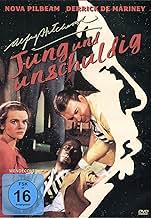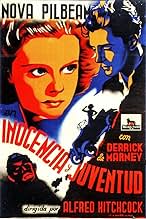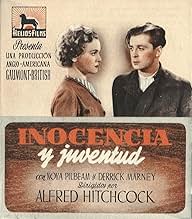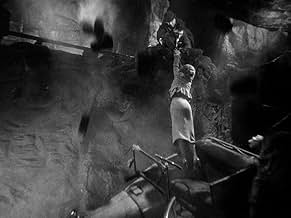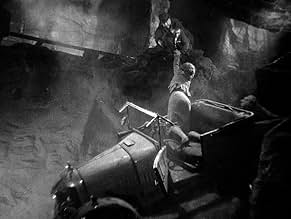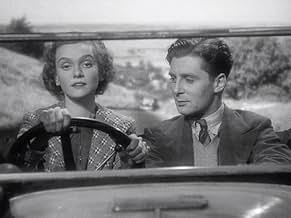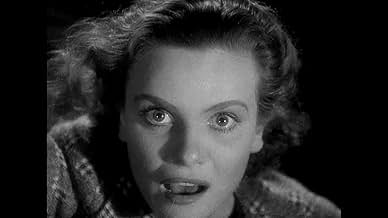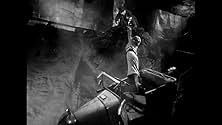IMDb RATING
6.8/10
12K
YOUR RATING
A man on the run from a murder charge enlists the help of a beautiful stranger who must put herself at risk for his cause.A man on the run from a murder charge enlists the help of a beautiful stranger who must put herself at risk for his cause.A man on the run from a murder charge enlists the help of a beautiful stranger who must put herself at risk for his cause.
- Awards
- 1 win total
Derrick De Marney
- Robert Tisdall
- (as Derrick de Marney)
Frank Atkinson
- Petrol Pump Attendant
- (uncredited)
Clive Baxter
- Burgoyne Boy
- (uncredited)
Pamela Bevan
- Little Girl at Party
- (uncredited)
Ernest Borrow
- Policeman Outside Courtroom
- (uncredited)
Featured reviews
A truly charming film from the Master of Suspense. Being a rather huge Hitch fan, I recently sought out some lesser known films from his early period. Of those I viewed ("Number 17," & "Murder!" among others) this one was my favorite--among the best of his Pre-Hollywood films. There is the usual mixture of humor and suspense, some nice camera work (including a wonderful precursor to the "key-in-hand" shot of "Notorious"), and most importantly, Nova Pilbeam. I'm not sure how this actress managed to play her scenes SO appealingly, and yet managed to have fallen SO completely off the acting radar. How many people today have her name rattling about their cerebral attic? Virtually none, I'd hazard, and yet she is terrific here--worth the effort of finding the video for her performance alone.
This film certainly is not in the same league as Hitch's best, but still is vastly superior to the average suspense film coming out of Hollywood today--or any other day, for that matter.
This film certainly is not in the same league as Hitch's best, but still is vastly superior to the average suspense film coming out of Hollywood today--or any other day, for that matter.
Aside from the suspense, there are several notable scenes. Two minutes into things, and a man opens a front door. Suddenly facing us just beyond the railing is a roiling wall of water, an angry sea about to pour over us. I grabbed my seat cushion, hoping it would float. Then there's the flop house full of snoring vagrants, dead cockroaches, and peeling paint. Right away, I reached past my highball glass and took the wife's Coke. Topping that, is the drive into the mine tunnel. It's a marvel of special effects and timing, with an effect as stunning, I believe, as anything in today's digitally drenched cinema. Nonetheless, I checked the garage to make sure my car was still on all fours. The final scene was a contrast since I'd just watched a 40's musical with wild-man drummer Gene Krupa. Here, it's like watching a wind-up toy slowly losing its mind.
Nova Pilbeam is not exactly a glamor girl, with her over-sized brow and snub nose; still and all, for an 18 -year old she's one heck of an actress. This is a pretty slender exercise for Hitchcock, nothing terribly profound and a lot like The Thirty-Nine steps of two years before. Too bad De Marney doesn't generate the kind of charisma or sympathy the Robert Donat part calls for. Hitchcock was to plow this furrow of racing against the law a number of times. Here, it's Pilbeam going against her civic duty and constable father to help prove accused murderer De Marney's innocence. Their bond of trust grows over time, showing once more that young love often sees what the law cannot-- at least as far as the movies are concerned.
This may not be top-flight Hitchcock. Still, there are the usual humorous touches, darkly suggestive moments, and imaginative moves with the camera. So if you've got a spare hour and half, see why England should never have allowed that funny looking, fat guy an exit visa.
Nova Pilbeam is not exactly a glamor girl, with her over-sized brow and snub nose; still and all, for an 18 -year old she's one heck of an actress. This is a pretty slender exercise for Hitchcock, nothing terribly profound and a lot like The Thirty-Nine steps of two years before. Too bad De Marney doesn't generate the kind of charisma or sympathy the Robert Donat part calls for. Hitchcock was to plow this furrow of racing against the law a number of times. Here, it's Pilbeam going against her civic duty and constable father to help prove accused murderer De Marney's innocence. Their bond of trust grows over time, showing once more that young love often sees what the law cannot-- at least as far as the movies are concerned.
This may not be top-flight Hitchcock. Still, there are the usual humorous touches, darkly suggestive moments, and imaginative moves with the camera. So if you've got a spare hour and half, see why England should never have allowed that funny looking, fat guy an exit visa.
This is a good Hitchcock film, but on the lighter side. The acting may be disputed (certainly many dispute about it!), but in my opinion it is a very solid, entertaining, and well-acted picture. It does have much of Hitchcock about it (not surprisingly) and is well worth watching. All of the classic Hitchcock elements are there, and they fit together wonderfully: the musical score, the camera work, the twists and turns in the plot, the thrilling scenes, the build-up, the director himself ... and not to forget the story! This is built up very carefully, and contains many, many interesting side-glances and elements. But one needs to watch the film very carefully, or more than once, in order to find these. It is indeed a sort of '39 Steps', and a precursor to several later Hitchcock films, but in its own way it occupies a place rather different than any other Hitchcock film. I am referring to a certain 'bucolic' atmosphere, which is perhaps only equalled by 'The Trouble With Harry'. The parallels to this film have perhaps not yet been adequately explored.
I have always been partial to Hitchcock's British films (Murder, Blackmail, 39 Steps, et al) and I consider this one another star in the crown. Granted, it may not be as sophisticated as his later films but few films from the 30's are. It has a certain charm and suspense that will hold your interest.
This film is filled with Hitchcock's cadre of actors that he used again and again in his early films.....and what a group they are! Nova Pilbeam (The Man Who Knew Too Much) was a rather strange looking girl but is perfect for the part of the young woman who helps a stranger; Percy Marmont (Secret Agent) as her father; Mary Clare and Basil Radford (The Lady Vanishes) as the aunt and uncle; John Longden (Blackmail) in his usual role as the detective......all these players are top drawer. Derrick de Marney is rather effete as the man on the run but is very effective in the part.
Several scenes are particularly outstanding. The opening beach shots are beautifully done and the chase is on! You hold your breath in the sinking car scene even though you know that Miss Pilbeam won't be lost so early in the story, unlike Janet Leigh in Psycho. But of course, the long tracking shot in the hotel as it zooms in on the drummer man is the one that most people remember and talk about. It's dynamite.
The rural setting is delightful and Hitchcock seldom used that slice of life in his films (with the exception of The Manxman). That may be what gives the film it's more easy going pace, it's more casual feel. Regardless, Young and Innocent (which is a rather awkward title), holds up after 66 years as just another example of the artistry of the Master. Enjoy it....it's worth it.
This film is filled with Hitchcock's cadre of actors that he used again and again in his early films.....and what a group they are! Nova Pilbeam (The Man Who Knew Too Much) was a rather strange looking girl but is perfect for the part of the young woman who helps a stranger; Percy Marmont (Secret Agent) as her father; Mary Clare and Basil Radford (The Lady Vanishes) as the aunt and uncle; John Longden (Blackmail) in his usual role as the detective......all these players are top drawer. Derrick de Marney is rather effete as the man on the run but is very effective in the part.
Several scenes are particularly outstanding. The opening beach shots are beautifully done and the chase is on! You hold your breath in the sinking car scene even though you know that Miss Pilbeam won't be lost so early in the story, unlike Janet Leigh in Psycho. But of course, the long tracking shot in the hotel as it zooms in on the drummer man is the one that most people remember and talk about. It's dynamite.
The rural setting is delightful and Hitchcock seldom used that slice of life in his films (with the exception of The Manxman). That may be what gives the film it's more easy going pace, it's more casual feel. Regardless, Young and Innocent (which is a rather awkward title), holds up after 66 years as just another example of the artistry of the Master. Enjoy it....it's worth it.
Young and Innocent (1937)
The title is appropriate to the point of being redundant, because in nearly every Alfred Hitchcock film the key theme is an innocent man accused. In this case, accused of murder, and the young man is a charming English actor, Derrick De Marney. As the police begin their hunt, he runs into the police chief's daughter, played by Nova Pilbeam, a tomboyish answer to Katherine Hepburn, and the real star of the movie.
This is a late British Hitchcock film, and it feels slightly raw around the edges, but it's so fast and likable and well constructed, you have to love it. In fact, the suspense of getting caught is balanced by some downright slapstick scenes that are brief and hilarious. And a reminder that this is a romp, the whole thing a beautiful, spritely entertainment. Never mind a killer is on the loose, because if one man is innocent of murder, another, out there somewhere, it not.
This is 1937, and by 1939 Hitchcock has moved to the U.S. to do Hollywood movies (including the amazing Rebecca in 1940), and so Young and Innocent and The Lady Vanishes (which has a similar quaint feel) wrap up his long British period. It says a lot for a movie to say I could watch it again, not because it's technically astonishing, but because it's just a joy, and very sweet. Never mind a little corniness or an inevitable ending, it's good!
The title is appropriate to the point of being redundant, because in nearly every Alfred Hitchcock film the key theme is an innocent man accused. In this case, accused of murder, and the young man is a charming English actor, Derrick De Marney. As the police begin their hunt, he runs into the police chief's daughter, played by Nova Pilbeam, a tomboyish answer to Katherine Hepburn, and the real star of the movie.
This is a late British Hitchcock film, and it feels slightly raw around the edges, but it's so fast and likable and well constructed, you have to love it. In fact, the suspense of getting caught is balanced by some downright slapstick scenes that are brief and hilarious. And a reminder that this is a romp, the whole thing a beautiful, spritely entertainment. Never mind a killer is on the loose, because if one man is innocent of murder, another, out there somewhere, it not.
This is 1937, and by 1939 Hitchcock has moved to the U.S. to do Hollywood movies (including the amazing Rebecca in 1940), and so Young and Innocent and The Lady Vanishes (which has a similar quaint feel) wrap up his long British period. It says a lot for a movie to say I could watch it again, not because it's technically astonishing, but because it's just a joy, and very sweet. Never mind a little corniness or an inevitable ending, it's good!
Did you know
- TriviaAlfred Hitchcock: Outside the courthouse holding a camera as Robert Tisdall (Derrick De Marney) escapes (at about 0:16:10).
- Goofs(at around 50 mins) When Erica Burgoyne and Robert Tisdall have taken refuge at night in a small town by parking her car next to a siding just before where the railroad underpasses a bridge, the entire scene has been staged and shot as an obvious miniature as revealed by three mistakes:
- the somewhat jerky motion and unnatural lighting of an automobile (indicating that it was pulled) as it moves across the bridge above the railroad
- the express train speeding under the bridge drags a length of cord behind it as it disappears from view
- the camera tracking in closer to the parked automobile hidden in the shelter of freight trains on sidings reveals that the figures of Erica and Robert are actually modeled and painted figurines, motionless until the shot suddenly changes to a medium closeup shot of the two actors.
- Quotes
[last lines]
Erica Burgoyne: Father, don't you think we ought to ask Mr. Tisdall to dinner?
- ConnectionsFeatured in Reputations: Hitch: Alfred the Great (1999)
- SoundtracksNo One Can Like the Drummer Man
(uncredited)
Written by Samuel Lerner (as Lerner), Al Goodhart (as Goodhart) and Al Hoffman (as Hoffman)
Details
Box office
- Gross worldwide
- $401
- Runtime1 hour 20 minutes
- Color
- Aspect ratio
- 1.37 : 1
Contribute to this page
Suggest an edit or add missing content


